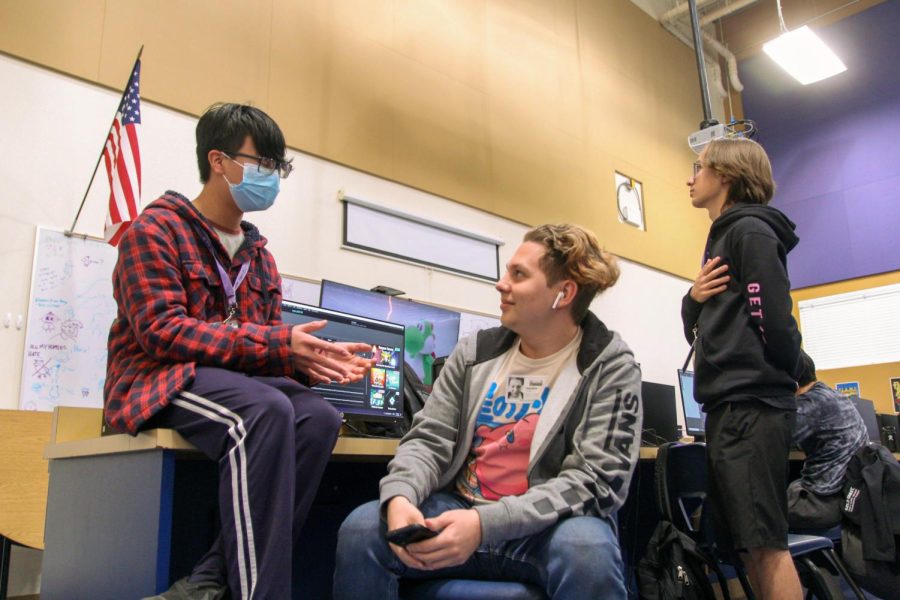RECONSIDER YOUR STANCE ON THE PLEDGE
Students around the country are rejecting common patriotic displays.
While some students are proud to stand for the Pledge of Allegiance during the morning announcements, an increasing number of students are choosing to sit out of the patriotic demonstration for personal reasons.
November 29, 2022
At the start of the year, I started noticing a growing trend in my morning class periods: a sizable portion of students in the class chose to sit during the Pledge of Allegiance, browsing social media, or talking with friends during the thirty seconds of silence.
This is not a new occurrence: influencers on online platforms such as Twitter have suggested kneeling during patriotic demonstrations as a form of protest for years now. This trend first entered the mainstream back in 2016, when Colin Kaepernick, a quarterback in his sixth season with the San Francisco 49ers, chose to sit on a bench as the national anthem was being recited.
In more recent times, this act of disapproval has seemingly become a regularity for students. Whether out of general disregard for patriotic affirmations, or due to genuine ideological conflicts with the statements expressed in the Pledge of Allegiance, the attitude of students and citizens toward their country has shifted noticeably.
As for most of the students I talked to, their lack of participation in the pledge is generally related to social stigma that comes from being the only person standing or sitting in a class. From what I’ve seen and heard, most classes are either all standing or all sitting. In the context of a high school, this is not surprising; it’s a very basic example of herd behavior that many of us are susceptible to. For other students however, standing during the Pledge of Allegiance is an issue of principle. Sitting for the pledge is a political statement for some students intended to express condemnation for the state of the country. Whether this is due to racism, economic disparities, or healthcare, many people see the Pledge of Allegiance as a way to bring attention to the bigger problems our country needs to face.
Influencers and students alike who participate in peaceful demonstrations using their platform have every right to do so. Their rights to free expression are unalienable and undeniably protected by the First Amendment: in fact, I encourage them to utilize their rights to express their opinions, and I would never support compelling any American to stand for something they don’t believe in. As decent human beings, we should respect the opinions of others and the lawful actions they choose to take as a result of their beliefs. However, further dividing ourselves is no way to influence change, and there are other compelling reasons disconnected from political affiliation why we ought to stand.
Martin Luther King Jr. demonstrated in his historic “I Have a Dream” speech that creating further divisiveness by rejecting the virtues of the country do not serve to create meaningful change. In fact, he was a patriot that deeply respected the sentiments of the country expressed in our Constitution and Declaration of Independence; he described the words in these documents as “promissory notes” to which every American citizen was to fall heir. His goal was to embrace the core values held dearly by our country while simultaneously recognizing that this promise had not been fulfilled, and that change was necessary. King set the example that we ought to unite people rather than divide them in every possible instance.
I feel that many people today misinterpret the point of our pledge. It is just as it sounds; it’s a promise to keep working, and a promise to stay committed to addressing the problems we face. Standing for the Pledge of Allegiance is not an admission that the United States is a perfect country, or that you support the current state of affairs in the nation. It is a promise that despite the state of the country we may find ourselves in, we will relentlessly work to fulfill the promise of liberty and justice for all. Though I consider myself to be patriotic and deeply believe in the foundational principles of our nation, I too acknowledge that our country has pressing issues which we should work tirelessly to resolve. The Pledge of Allegiance is a set of ideals that the citizens of the country should strive to live up to: why should we make this controversial?
Americans are some of the most privileged and free populations throughout the entire history of civilization; this is not to undermine the legitimate struggles of some groups in this country, as abhorrent instances of injustice undoubtedly continue to manifest themselves. But this is the bitter struggle we must accept: new, seemingly impossible problems will continue to arise throughout the remainder of our society, no matter how much we try to prevent them. To keep our resolve, we must unite and continually defend the ideals worked to establish as a free country.
The simplest way to start? Just stand for the pledge.









